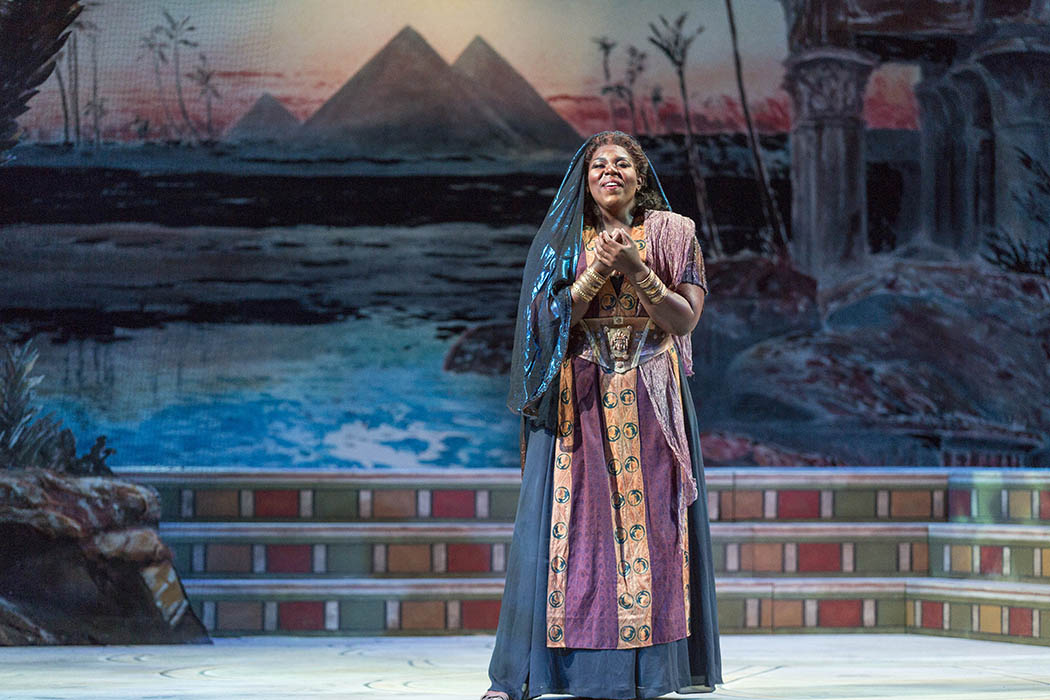In almost every decade, it seems, music writers love to dig up an age-old question: “where are the great Verdi sopranos?” Although even defining what a “Verdi soprano” is can transform a usually civil conversation into a mildly heated exchange, most can agree that the lirico-spinto and the dramatic-soprano are what one normally thinks of when using the term. But, to the point, are there 21st Century sopranos in the category of Zinka Milanov, Leontyne Price, Aprile Millo, Birgit Nilsson, and Maria Callas? An answer of YES seems obvious, but that question is once again a valid one for Knoxville Opera as it offers up a production of Giuseppe Verdi’s Aida, its title role a defining moment for the sopranos who absorb the challenge.
Cast in that title role for Knoxville Opera is soprano Michelle Johnson, a singer who readily expresses her enthusiasm for Verdi, the character of Aida, and who has a definite claim as a notable 21st Century Verdi soprano. Having sung the role a number of times—notably at Glimmerglass Opera in 2012, Sarasota Opera in 2016, and a concert version with Columbus Opera this past February—Johnson has carefully drawn from those past experiences in finessing the role.
“The one thing I’ve learned from doing the role is not to fear it,” Johnson admits. “All of the great sopranos have sung it—my favorite is Leontyne Price. She could do no wrong in my book when it comes to this role. The first time I did it, I was very young and there was so much pressure because of all the tradition behind it. I wanted to do my best, but I also wanted to honor what people are used to hearing. The more I do it, the more it becomes a part of me. I have been able to put my own stamp on it and am very comfortable with it.”
Johnson is a graduate of the Academy of Vocal Arts in Philadelphia and was a Grand Finals Winner in the 2011 Metropolitan Opera National Council Auditions. Since then, she has gravitated toward Verdi roles like Leonora in Il trovatore and Élisabeth de Valois in Don Carlos, Puccini roles like Minnie in La Fanciulla del West, Mimi in La Bohème, and the title role in Manon Lescaut, and Donna Anna in Mozart’s Don Giovanni. However, with the music of Verdi and the role of Aida, passion seems to dominate Johnson’s approach.
“Verdi’s music is so passionate, and that passion helps the drama. And the drama helps you navigate the role. And the drama helps you connect to the audience, because it is very relatable. And yes, who hasn’t had a forbidden love before?”
For that forbidden love we travel to Egypt in the time of the Pharaohs. The warrior Radamès learns that Ethiopia is preparing an attack against Egypt and hopes to command the Egyptian army. However, he is in love with Aida, the Ethiopian slave of Princess Amneris, the Egyptian king’s daughter. However, Amneris loves Radamès, setting up the quintessential operatic tragic triangle, not only of love and passion, but of deceit and betrayal.
“It is one of those roles where you have to find what works for you,” explains Johnson. “I go the more dominant route; I go for a more physical, visceral Aida. Because she is in agony the entire show. There is a point where she has to choose the love of her life or duty to her family, her people. That’s a lot for one person. She’s been enslaved, no one knows she is of royal blood, so she has to hold that in. She’s going through so much, when you get to see Aida let out her emotions, like in Act I with “Ritorna vincitor!”, she goes for it and that’s the first time you really get to see the anguish she’s going through.”
The anguish comes to a head in the opera’s Act III, set on the banks of the Nile.
“Act III is a marathon for Aida. You go from an aria which is gorgeous and lyrical [“O Patria Mia”] that is so exposed, straight into the duet with Amonasro with all its pleading and emotion, then Verdi throws you straight into another duet with Radamès. So, in Act III, I really have to pace myself and make sure that I’m not giving away too much too soon.”
Despite the grand scale of the typical Aida, and the size of this Knoxville Opera production—following tradition with its huge sets and cast, chorus, and extras numbering over 200—Johnson feels the opera itself is something different.
“So many people think of Aida as this huge, humongous opera, but no—it really boils down to a little love trio: two ladies in love with the same guy—who is going to win?”
Knoxville Opera’s production of Giuseppe Verdi’s Aida
Friday, May 4, 2018 at 7:30 PM
Sunday, May 6, 2018, at 2:30 PM
Knoxville Civic Auditorium, Downtown Knoxville
Music director and Conductor: Brian Salesky
Stage Director: Dean Anthony
Choreographer: Lisa McKee
Cast
Ramfis — Kevin Thompson
Radamés — Dongwon Shin
Amneris — Sabina Kim
Aida — Michelle Johnson
King of Egypt — John Dominick III
Messenger — Darius Thomas
Termuthis — Caitlin Bolden
Amonasro — Scott Bearden






